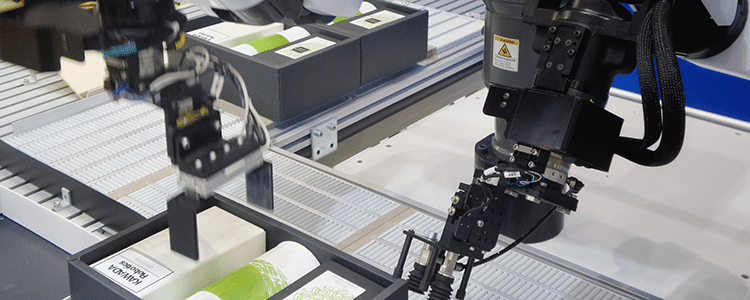For years, business leaders have turned to enterprise resource planning (ERP) systems to help them manage, automate and streamline their operations. What if ERP could learn on its own and become even more intelligent, robust and capable than ever before?
Well, machine learning in ERP is a reality. Many ERP vendors have developed machine learning capabilities that make an already-powerful tool even more powerful.
These new solutions are changing the ERP sphere for the better. Read on to learn five of the top benefits you can expect when you transition from legacy systems to today’s advanced alternatives.
Machine Learning and ERP Deployment Models
When you think of machine learning or artificial intelligence, your mind likely goes straight to the cloud. After all, the cloud is the platform for a variety of machine learning projects, including those from Microsoft Azure, Amazon Web Services and Google Cloud Platform.
However, even on-premise ERP installations can benefit from machine learning, as long as business leaders take a hybrid cloud approach. Or, they can leverage this functionality in a pure cloud-based ERP environment.
ERP Selection Guide
This ERP Selection Guide will help you select technology that will support your organization for at least the next ten years.
Pain Points of Traditional ERP Systems Solved with Machine Learning
Over the years and through layers of customization, legacy ERP systems have started to lose their flexibility and functionality. A legacy system is an older enterprise software solution that is no longer being enhanced. They were first created in the 1980s or early 1990s and are often based on older technology, such as the IBM AS/400 platform, Progress Software or even DOS.
These older systems simply aren’t able to keep pace with the digital business models that define the modern enterprise.
Are you thinking of replacing your traditional or legacy ERP system with a machine learning ERP solution? Let’s take a look at a few of the pain points this might solve:
- Data entry reliant on manual input and susceptible to human error
- The need to manually combine disparate spreadsheets onto the virtual platform
- Outdated customer and employee-related data
- Relational databases that take too long to update, hindering decision-making
- Too much lag time between problem identification and resolution
- Limited analytical insights and inaccurate, short-term forecasting
All the above are critical issues that could impede your organization’s progress and limit its competitive advantage. However, machine learning has the potential to reverse or eliminate many of these challenges.
Benefits of Machine Learning in ERP
Next, let’s review a few of the key benefits you can expect when you integrate this capability into your ERP design. As with any ERP implementation, the business benefits you realize depend on the alignment of your people and processes with the technology you’re implementing. In other words, focusing on business process management and organizational change management can increase your benefits realization and return on investment.
1. Quicker Root Cause Analysis
If you experience a maintenance issue with your legacy ERP system, a service technician could take days to get to the root of the problem. In contrast, machine learning ERP supports technicians with a more thorough root cause analysis, allowing you to learn about difficulties earlier, sometimes even before they appear.
With this advanced knowledge, you can take a proactive approach to maintenance, rather than a solely reactive one. With detailed insights, you’re able to take quicker action and prevent small issues from quickly escalating into more significant challenges.
At the same time, your Maintenance, Repair, and Overhaul (MRO) timelines will subsequently improve. With machine learning, you can more easily pinpoint issues to the component-level and even the part-level, keeping all items in working condition and expanding your revenue streams.

2. Personalized Data Insights
What if you could have a detailed, customized look into your workflows to figure out what’s working and what isn’t? How could your processes and customers benefit from the same ERP business intelligence?
With machine learning ERP, you can tailor your data insights to reveal precisely what you want to learn. As the machine learns your preferences, these insights will only become stronger over time, creating new operational efficiencies and enabling customer experience transformation.
3. Improved Predictive Analytics
When you invest in any ERP system or business analytics app, you’re probably looking for robust reporting capabilities, whether this is demand forecasting or ERP financial reporting. However, many legacy systems lack this feature, at least to the degree that modern business leaders require it.
Fortunately, when you integrate ERP software with machine learning capabilities, you can leverage historical data to more accurately predict seasonal trends and future growth. For instance, knowing the rate that your inventory is flying off the shelves can help you predict when you’ll need to restock to keep your clients happy and avoid costly delays.
This is especially relevant in the event of a global supply chain disruption.
4. Improved Production Capacity
Could your ERP system help your organization become more productive? This is typically the case, and especially with machine learning.
Systems with this capability can improve yield rates across all levels of your enterprise, from your machine systems to your manufacturing plants. With a closer eye on your utility use and infrastructure, you can create a more efficient workforce, reducing your material waste while maximizing your output.

5. Higher Product Quality
Have you noticed a dip in your quality levels lately? Even one negative review on social media could send your company into a tailspin, so it pays to keep your products and services top-notch.
Thankfully, machine learning ERP is designed to help you achieve this aim. These systems help you analyze your current offerings and determine which processes and workflows are improving or hurting your overall quality rating.
You can then compare your findings against industry quality regulations, such as Six Sigma performance standards.
Find Your Next ERP Solution
Making the leap from legacy systems to machine learning in ERP can be daunting. After all, the concept of machine learning itself sounds like something straight out of science fiction.
However, this technology is available and accessible right now, and it’s one of the most potent and promising ERP integrations to hit the market. If you want to learn more about ERP selection and how to evaluate modern ERP systems, schedule a free consultation below to speak with our ERP consultants.













